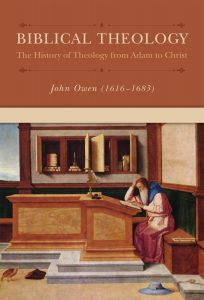 Biblical Theology,
Biblical Theology,
John Owen, Translated from the Latin edition of 1661 by Stephen P. Westcott,
Soli Deo Gloria, hbk, 861 pp., £35.
This massive tome was first published by John Owen in 1661, and was not included in the standard 16 volumes of his Works in the nineteenth century edition for the simple reason that it was still only available in the original Latin. This translation into English, first printed in 1994, was therefore very welcome, making the material available for the first time to a popular readership.
Ironically, this recent provenance gives the English text a freshness of tone that would otherwise be lacking, as Owen’s vernacular prose is notoriously dry and heavy. However, the book remains through sheer length a demanding read, albeit one that will reward persevering attention.
The title is possibly a little misleading, as the term ‘Biblical theology’ is generally used nowadays, following Geerhardus Vos’s book of the same title, for the history of God’s revelation, whereas this work is rather a history of theology as it developed in human history, both in the progressive advancement of the understanding of God’s people through revelation and equally through the downgrade into idolatry and apostasy of much of the World’s population.
True theology is shown to have its origin in Adam’s knowledge of God in the Garden of Eden, through the whole testimony of creation and Creator alike to his unfallen intellect. But with the Fall, the knowledge of God derived from creation is inadequate as a basis for theology, which thus rather depends on God’s revelation of Himself.
Owen displays massive learning in developing the subject, especially regarding the progressive development of idolatry amongst most of the human race in the generations after the Flood. However, the book is undoubtedly somewhat rambling in structure, with long digressions on subjects of contemporary controversy, such as the ‘notes’ of the Church, in answer to a Romanist apologist, bearing little relevance to the developing argument of the book as a whole. He does also include some dubious speculation, such as the theory that Joseph of Arimathea visited Britain.
There are strikingly useful passages though, such as Owen’s concise but illuminating surveys of the theology of Abraham (pp. 364-69), and of Moses (esp. pp.434-38), and some novel but important topics addressed. For example, Owen contends that Hebrew was the language of Eden, and advances two compelling arguments: the names of individuals given in the early chapters of Genesis have etymological significance in Hebrew only (e.g. Genesis 3:20), and could not therefore be an correctly testified in the Scriptures if Hebrew was not the vernacular; and that the confusion of the tongues at Babel was a judgment on the ungodly builders, which would not apply to the faithful ‘seed of the woman’, and thus Abraham’s use of the language later known as Hebrew would stand in direct continuity with the Patriarchs.
However, there are also a couple of points at which later scholarship has shown Owen’s arguments to be wrong. In particular, he contends that the first alphabetic writing was given by God on the tables of stone at Mount Sinai. Modern archaeology shows, however, that in the preceding centuries early alphabetic writing was in use, though interestingly in the same part of the world, amongst Semitic workers on the Sinai peninsula, suggesting that the Lord adopted this system, already pre-existent in His Providence, and doubtless known to Moses and other Israelites through their work in that area, for the beginning of His written revelation.
Owen is also wrong to contend that the lettering of these days was the same as ‘modern’ Hebrew (in fact, scholars now have evidence of the alphabet of ‘paleo-Hebrew’), and is gravely in error in arguing that the vowel pointing, the system of markings under Hebrew letters (now known to have been developed by the Masoretes in the early Middle Ages), was part of the written inspiration of the Word. He is disappointingly dogmatic on these matters in arguing against the defenders of the correct views.
For example, he asks, if the vowel pointing is uninspired, ‘would not the very foundations and structure of Scripture be undermined and, at length, cast down’ (p.512)? In fact, this question can be firmly answered in the negative. While it is true that the same string of consonants can sometimes form several different words in Hebrew dependent on the pointing, the context will usually determine decisively which is correct. Indeed, to a natively fluent speaker of Hebrew, this presents so little problem that modern Hebrew text – as any visitor to Israel can see – is generally unpointed, with vowel markings only routinely used for foreign words being rendered in Hebrew script, where the correct pronunciation requires to be specified.
But the central argument of Biblical Theology stands: that Christ is the author of all true theology; that it can be rightly grasped, in the sense of any real knowledge of God, only through the operation of the Spirit upon the soul; and therefore that theology cannot simply be treated as another academic discipline for detached study. True theology does not minister to the prideful spirit of the human heart, but rather to the subjection of the soul before the true and wondrous God, especially as He is revealed in the work of salvation.
Owen emphasizes how the misunderstanding of this truth has resulted in much error entering the Christian Church, especially through the importing of categories and attitudes from secular philosophy. His final chapter on the study of theology, in which it is presented as a spiritual rather than an intellectual growth, is very insightful. As those who seek to know God, it is precious for us to remember that this is ultimately a relationship, not an academic subject. Coming from an academic theologian of Owen’s eminence, who served as vice-chancellor of Oxford University, this is a helpful and encouraging message.


Leave a Reply